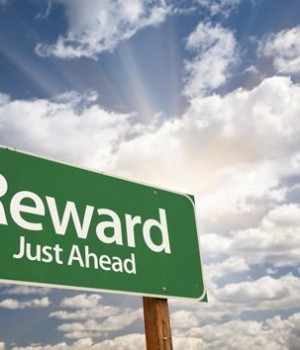Rewarding your employees just makes good sense.
They are your team. Indeed, in a small business, they are your family.
And it’s important to recognise them when they do a particularly good job.
However, there’s one problem with giving out rewards to your employees: coming up with those rewards… especially if you’re on a tight budget.
We asked our readers on Facebook to share their most useful staff rewards.
Here’s what they said…
1. Posh Parking
This reward is a classic and it’s easy. Give up your reserved parking space.
Let your key staff park close to the entrance as a reward. Or, simply make it clear that if someone needs that park (maybe they need to dash off early to pick up the kids) it’s theirs to use.
The ‘reserved park’ is a daily public reminder that their hard work is noticed and appreciated.
But be careful… if used incorrectly, as a ‘competition-based’ incentive, it can lead to unexpected consequences and have the opposite effect, decreasing team moral.
Simply save this reward for when someone has done a great job.
2. “Free Day” Passes
It seems counterintuitive to give someone who is working hard for your organisation a pass that lets them skip a day of work, no questions asked, for doing a great job.
They’re highly productive. Shouldn’t the goal be to keep them in the office?
In reality, the goal should be to keep your top-performers happy, which is what this reward is all about.
Now they don’t need to worry about using up vacation time or calling out sick for a sudden emergency.
And, for you, because you know how many passes you’ve given out, it makes these unexpected absences more predictable and easier to cope with.
We all need a ‘mental health day’ from time to time.
3. Spread the Reward Points around
Rewards programs (like Qantas’ Aquire, which we use) offers discounts on selected Qantas fares, as well as Aquire Points for spending with any of its partners.
Aquire Points can then be converted one-to-one for Qantas Points to be used for reward flights or even upgrades to Business and First class. The points you earn from Aquire can even be allocated to staff as reward or recognition for them to use towardsa holiday. Oooh yeah!
That’s right. Your Aquire Points can also be transferred to your employees.
Rewards programs offer a way to turn business expenses into Qantas Points for your hardest workers… and maybe a few for yourself, too. You work hard, too, right?
We all need to buy stationery, insurance and other mundane things, right? This tactic is simply about turning the mundane into easy rewards.
4. Short Feedback Loops (Gamify things)
Once upon a time, it was thought that humans in the workforce were primarily motivated by money.
That may have been true in the early days of the industrial revolution but it’s no longer the case.
In the 1970s and 1980s, motivation theory shifted toward the presentation of plaques and other public status symbols, like ‘Employee of the month’. It’s now known that these tactics, when used in isolation, independently of other initiatives, are no longer effective either.
Based on the staggering popularity of computer games, the latest wave of motivation theorists have come to understand that one of the strongest influencers on motivation is feedback.
That’s right. It’s that simple. Feedback fuels motivation.
However, most employers only provide feedback a few times a year. (Sad, right?)
Compare this semi-sporadic feedback with the highly addictive nature of computer games, which tell you whether you are doing well or badly during every second of the game.
What’s the lesson here… provide feedback often and provide it fast.
5. Staff Training and More Projects
It might sound strange to offer ‘more work’ as a reward.
However, by letting staff know that you are thinking about their ‘long-term’ education and demonstrating that you have ‘long-term’ intentions for them in your company, you’re letting them know that they are valued.
Furthermore, all humans require challenges of increasing complexity (that’s another reason why computer games are so addictive). Training stimulates the brain and new challenges keep us motivated.
But, most importantly, both these rewards demonstrate ‘trust’.
And ‘trust’ is one of the most motivating gifts you can give anyone.
In summary… say… Thank you!
Provide the rewards but never forget to articulate your appreciation and say…
Thank you.
Read more about:
Qantas’ Aquire Program for your business.
Feedback loops in the workplace.






![THE ULTIMATE CASHFLOW CHECKLIST [FREE DOWNLOAD]](https://anthillonline.com/wp-content/uploads/2016/06/james-Seven-simple-strategies-to-cut-costs-04.pdf-Box-2016-06-30-13-49-35-300x194.png)
![Want more credibility and influence? Unlock the 12 principles of persuasion checklist [FREE DOWNLOAD]](https://anthillonline.com/wp-content/uploads/2016/03/james-persuasion-and-influence-nfsu-02.pdf-Box-2016-03-24-15-09-44-100x75.png)
![Five essential ingredients for a humming homepage with James Tuckerman [FREE REPORT]](https://anthillonline.com/wp-content/uploads/2015/07/homepage-checklist-1680-01-copy-100x75.png)
![Seven essential steps to a successful podcast with Loren Bartley [Cheat Sheet]](https://anthillonline.com/wp-content/uploads/2015/11/Screen-Shot-2015-11-26-at-11.21.58-100x75.png)
![Instagram for Business… in 12 steps [FREE INFOGRAPHIC]](https://anthillonline.com/wp-content/uploads/2015/08/Capture7-100x75.jpg)
![How to pitch sales and marketing ideas to your boss with James Tuckerman [FREE REPORT]](https://anthillonline.com/wp-content/uploads/2015/07/Render-3-100x75.png)

![Why entrepreneurs need to know this awesome … squirrel! [VIDEO]](https://anthillonline.com/wp-content/uploads/2014/06/Squirrel-300x350.jpg)
![Would James Bond drive a Kia? Superbowl 2015 ad [VIDEO]](https://anthillonline.com/wp-content/uploads/2015/02/brosnan-300x350.jpg)
![If someone says “I want it to go viral”, chances are, I’ll go postal [VIDEO]](https://anthillonline.com/wp-content/uploads/2012/11/Buyral.jpg)
![The Facebook Honey Trap with James Tuckerman [CHEAT SHEET]](https://anthillonline.com/wp-content/uploads/2015/11/Screen-Shot-2015-11-26-at-11.34.14-300x194.png)
![Do you have happy staff? 5 ways to improve performance [FREE DOWNLOAD]](https://anthillonline.com/wp-content/uploads/2016/06/chris-smith-cheatsheet-04c.pdf-Box-2016-06-30-20-45-20-100x75.png)
![The Ultimate Social Media Almanac with James Tuckerman [Cheat Sheet]](https://anthillonline.com/wp-content/uploads/2015/11/Screen-Shot-2015-11-26-at-11.24.55-100x75.png)
![New Zealand’s Xero eyes US IPO, further disruption as subscribers increase [INFOGRAPHIC]](https://anthillonline.com/wp-content/uploads/2014/07/sruuuuujana-212x194.png)
![Ever wonder if your ‘content marketing’ is really just crap? You gotta see this! [INFOGRAPHIC]](https://anthillonline.com/wp-content/uploads/2014/08/content-100x75.jpg)
![7 Business Lessons From Game of Thrones [INFOGRAPHIC]](https://anthillonline.com/wp-content/uploads/2014/10/infographic-games-of-thrones-041-100x75.jpg)
![How to build your own Media Empire… In seven steps with Nathan Chan [INFOGRAPHIC]](https://anthillonline.com/wp-content/uploads/2014/10/Nathan-Chan-Infographic-e1413419529176-100x75.jpg)
![5 Business Lessons From Tinder [INFOGRAPHIC]](https://anthillonline.com/wp-content/uploads/2014/10/Tinder-Elegant-Infographic-100x75.jpg)



